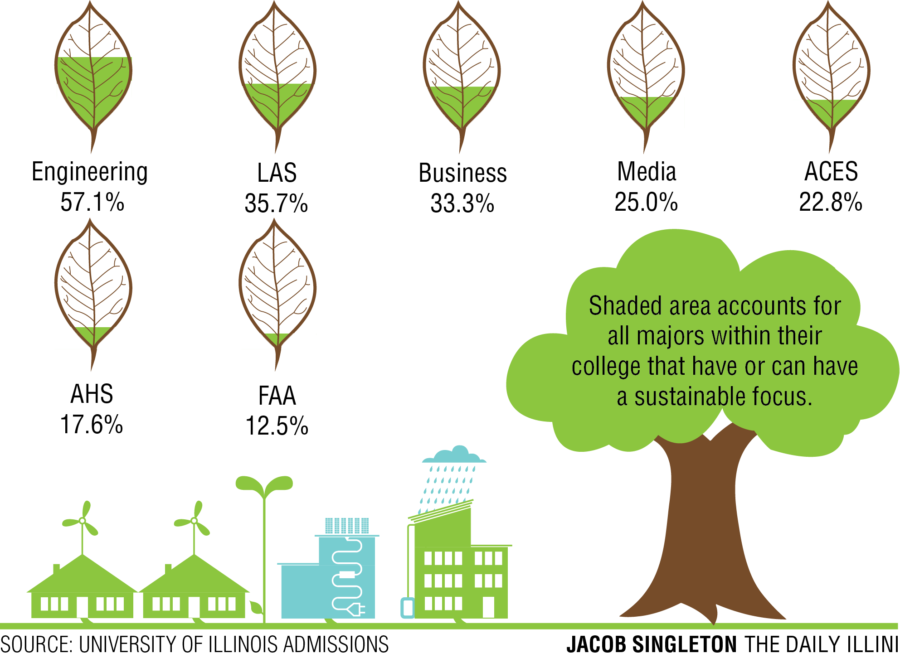University, RSO efforts hope to increase campus sustainability
Jan 26, 2016
With President Obama’s State of the Union address on Jan. 12 and the recent Paris Climate Deal, sustainability and climate change have been hot topics. But this topic has also been discussed at the University, through the University’s new iCAP initiative and other green-focused Registered Student Organizations students.ss
Erik Isbrandt, senior in engineering, is currently studying sustainability and green building at the University. Isbrandt said not everyone understands the importance of sustainability.
“I think many people aren’t aware how to incorporate sustainable practices into their professional and personal lives,” Isbrandt said. “People think recycling and not littering is all they can contribute because they haven’t been educated enough. The challenge is not only an environmental issue either; it is an issue that will test humanity’s ability to change for a greater moral cause. I don’t believe it’s about saving the Earth, but rather about creating a sustainable civilization for all of humanity to thrive off of for the rest of our existence.”
Like Isbrandt, a University RSO “UIUC Students for Environmental Concerns,” also known as SECS, believe climate change and the need for sustainability is a serious issue that needs to be addressed.
Allison Steffens, junior in LAS and current president of SECS, said the organization works to “promote environmental action on campus by either spearheading campaigns ourselves or collaborating with other organizations on projects that lead to a greener earth.” She said it is the oldest and largest environmental group on campus.
Get The Daily Illini in your inbox!
Steffens originally came to the University to study molecular cellular biology with the intent of eventually going to medical school. Steffens joined SECS as a freshman as a way to make friends, and at that time, did not consider herself an environmental activist. She decided to change majors because of the experience.
“I would definitely say SECS had a big impact on changing majors. From being in the club and becoming exposed to environmentalism, I saw how important it was,” Steffens said. “As humans, we are very dependent on natural resources and the environment. In order to secure the future, it’s important to use things carefully to make sure the world is functioning and the human race goes on.”
Instead of medical school, Steffens hopes to pursue a dual degree in law and urban planning after graduation.
On a larger level, the University has created a plan to change their impact on the environment.
In 2015, the Illinois Climate and Action Plan, or iCAP, was created by the University with the goal to achieve carbon neutrality as soon as possible — and no later than 2050. The University committed to the act when it signed the Carbon Commitment, formerly known as the American College and University Presidents’ Climate Commitment, in 2008. The plan includes a list of goals, including providing immersive sustainability learning opportunities to increase education and outreach.
While the University offers over 250 sustainability related courses, some students feel it is not enough.
“I’ve taken elective classes before about sustainability, but I do think the University could do more to educate students who don’t enroll in the offered classes,” said Meghan Fabian, senior in LAS.ss “Not everyone that goes through undergrad here has the time or interest to take these classes, which is a shame. Basic things such as increasing recycling opportunities for on and off campus housing would be a great start.”
Steffens believes that the University does a good job at educating students on the importance of sustainability.
“Collectively, I believe there are a good range of RSOs and classes that allow students to explore environmentalism and sustainability,” Steffens said.
Regardless of the opportunities on campus, Fabian said she believes the topic of sustainability needs to be addressed.
“I do believe that sustainability is important and is an immediate problem that should be addressed campus wide,” Fabian said.
Clarification: A previous version of this article stated that the University signed the American College and University Presidents’ Climate Commitment in 2008. The article should have stated that the University signed the Carbon Commitment, formerly known as the American College and University Presidents’ Climate Commitment.






